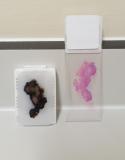Test Directory
USP6 gene rearrangement
Containers - Adult

FFPE block / H&E slide / Pathology report
|
|
Laboratory Site
Old Dalkeith Road
Edinburgh
EH16 4SA
Transport arrangements
Referral specimens should be sent directly to Molecular Pathology at the above address (see transport recommendations). For patients with pathology specimens held within NHS Lothian there is no need to arrange transport of specimens.
How to request
Testing for NHS Lothian patients can be requested by email to molecular.pathology@nhslothian.scot.nhs.uk or by discussion with an NHS Lothian Pathologist. Referral requests may be accompanied by a completed request form or covering letter.
Please also refer to our detailed requesting instructions.
Availability
Monday - Friday. 09:00 – 17:00
Anticipated turnaround
Turnaround times will vary depending on the nature of the report required.
Individual FISH results should be available within 10 working days. See results.
Static information/disclaimer
This test is accredited to ISO 15189.
Please note: alternative methodologies may be used. Full details will be included in all reports.
General additional information
Aneurysmal bone cyst (ABC) is a benign expansile osteolytic neoplasm which may arise de novo or secondary to a pre-existing bone tumour. Around 70% of primary ABCs demonstrate spindle cells with translocations involving ubiquitin-specific peptidase 6 (USP6) with promoter partners including CDH11, COL1A1, OMD, TRAP150 and ZNF9, leading to transcriptional upregulation of USP6. Such translocations are absent in secondary/reactive ABC.
USP6 rearrangements with MYH9 at 22q12.3 are detectable in 90% of cases of nodular fasciitis (NF), a self-limited mesenchymal lesion of myofibroblastic differentiation.
A positive USP6 gene rearrangement result is considered to be supportive evidence where a pathological diagnosis of NF or primary ABC is being considered.
USP6 gene rearrangements are detected by break-apart fluorescence in-situ hybridisation (FISH) analysis. The method will identify a chromosomal rearrangement involving the USP6 locus at 17p13.2, but not the specific gene fusion partner.
For clinical advice on appropriate investigations, please contact our Molecular Pathology team.